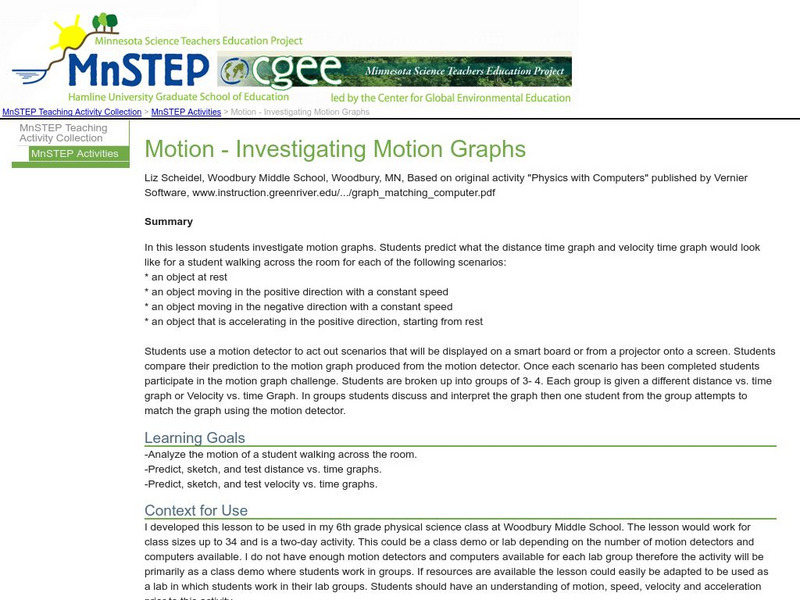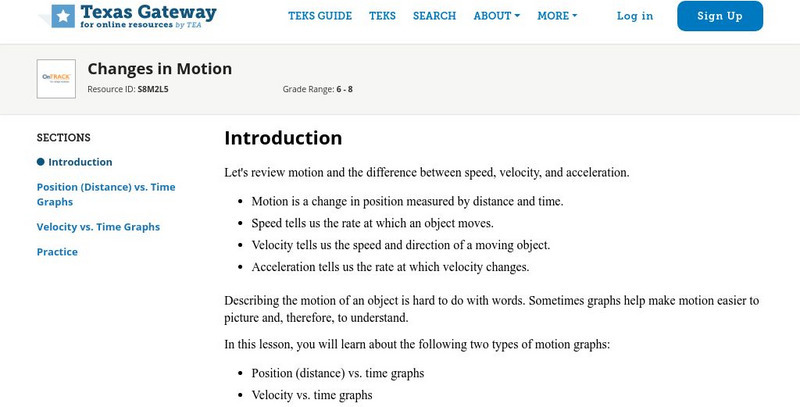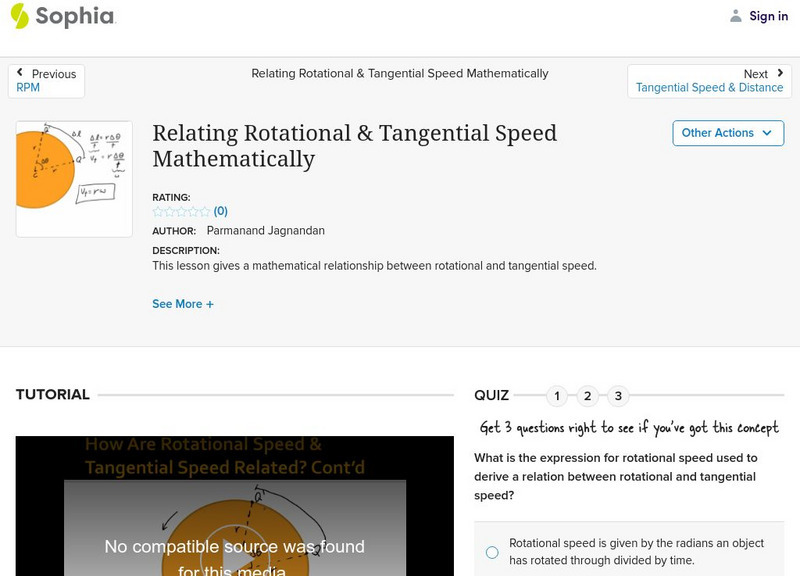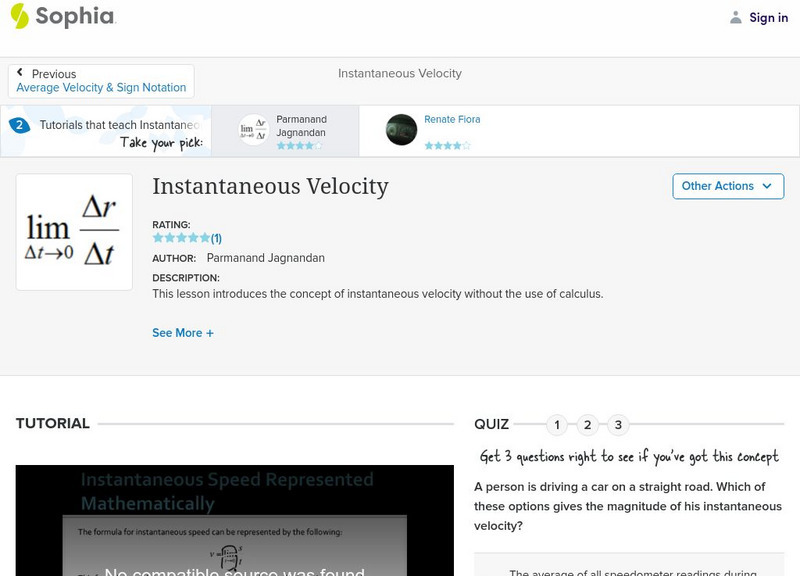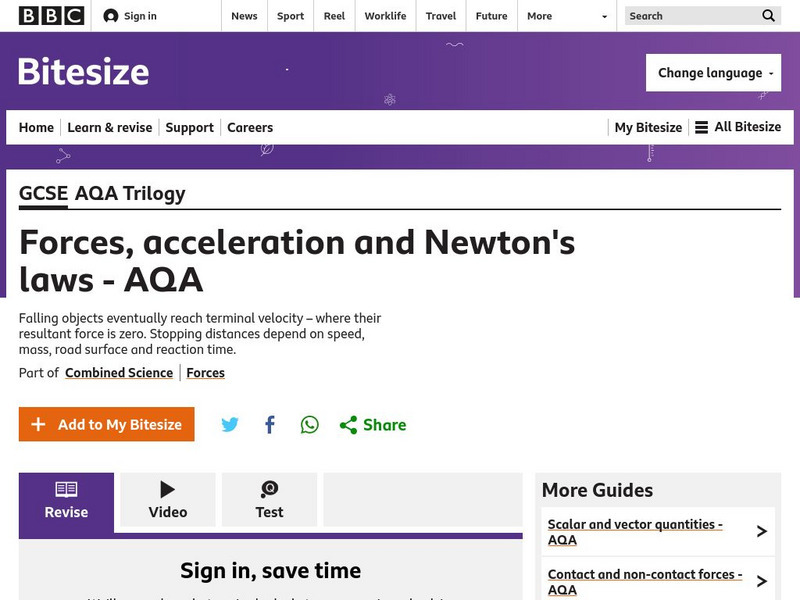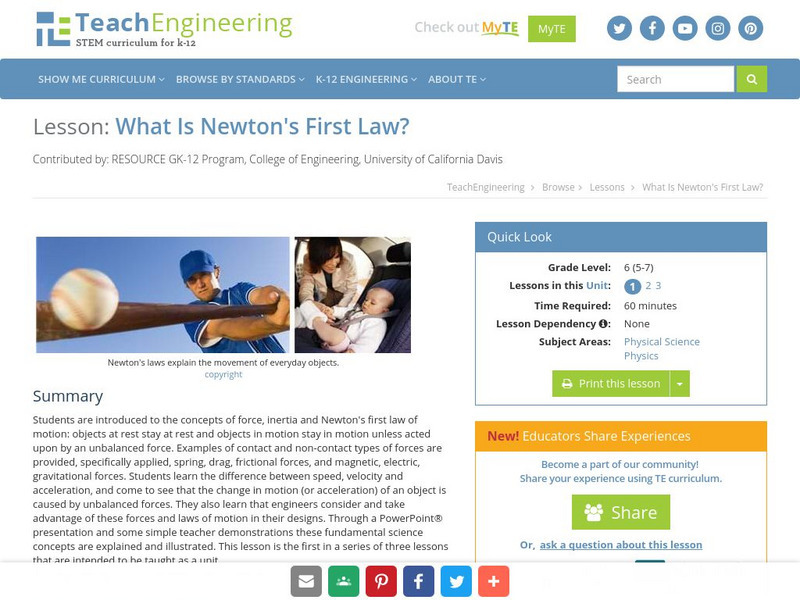Sophia Learning
Sophia: Speed & Velocity
A slide show with three accompanying video lesson segments illustrating the difference between speed and velocity, and demonstrating how to calculate average speed and velocity. [6:31]
CK-12 Foundation
Ck 12: Physical Science: Position Time Graphs
[Free Registration/Login may be required to access all resource tools.] How motion and speed can be represented by a distance-time graph and how average speed can be calculated from it.
BBC
Bbc: Gcse Bitesize: Motion
This lesson focuses on how to calculate average speed and distance traveled. It also explains how to convert different units of measure and provides a link to an assessment.
Science Education Resource Center at Carleton College
Serc: Motion: Investigating Motion Graphs
In this lesson plan, students investigate motion graphs. Students predict what the distance-time graph and velocity time graph would look like for a student walking across the room for three different scenarios.
Physics Classroom
The Physics Classroom: Circular and Satellite Motion: Speed and Velocity
In this interactive module, describe and explain the motion of objects that either move in circles or can be approximated to be moving in circles. Kinematic concepts and motion principles will be applied to the motion of objects in...
Physics Classroom
The Physics Classroom: Circular and Satellite Motion:circular Motion Mathematics
Using the values of speed, acceleration, and force, students explore and analyze the motion of objects in circles.
Texas Education Agency
Texas Gateway: Changes in Motion
In this lesson, you will learn about position vs. time graphs and velocity vs. time graphs and how to use them to solve problems.
Physics Classroom
The Physics Classroom: 1 D Kinematics: Scalars and Vectors
This illustrated tutorial focuses on several examples of vector and scalar quantities including distance, displacement, speed, velocity, and acceleration.
Science Education Resource Center at Carleton College
Serc: Bumps and Buckles: A Lesson on Motion
In this physics lesson, the students will be learning that motion can be changed when a car goes down a ramp. By adding "speed bumps" in different lengths away from the ramp, they will observe what happens to their car. Students will...
Physics Classroom
The Physics Classroom: Describing Motion With Words
This lesson from the Glenbrook South High School gives a nice review and detailed explanation of velocity, speed, distance, displacement, and acceleration. A good introduction to the "language of Kinematics."
BBC
Bbc: Gcse Bitesize: Motion
This lesson focuses on motion including definitions, how to calculate the change in velocity and the average acceleration, and a link to an assessment.
Physics Classroom
The Physics Classroom: Circular and Satellite Motion: Satellite Motion Math
In this interactive physics tutorial, students explore the variety of mathematical equations that describe the motion of satellites.
Sophia Learning
Sophia: Relating Rotational & Tangential Speed Mathematically
A video lesson relating rotational speed and tangential speed. Video derives equation to show how to find tangential speed based on rotational speed. [4:32]
TeachEngineering
Teach Engineering: What's Up With All This Traffic?
Expanding on the topic of objects in motion covering Newton's laws of motion, acceleration and velocity, which are taught starting in third grade, middle schoolers are introduced to new concepts of speed, density, level of service (LOS)...
Physics Classroom
The Physics Classroom: 1 D Kinematics: Table of Contents
Learners examine motion with words, equations, diagrams, and graphs. Some topics investigated are position, velocity, acceleration, and free fall. The tutorial consists of lessons and problems to check for understanding.
Sophia Learning
Sophia: Instantaneous Velocity: Lesson 1
This lesson introduces the concept of instantaneous velocity without the use of calculus. It is 1 of 2 in the series titled "Instantaneous Velocity."
BBC
Bbc: Gcse Bitesize: Forces, Acceleration and Newton's Laws Aqa
This lesson focuses on Newton's First Law: an object remains in the same state of motion unless a resultant force acts on it. If the resultant force on an object is zero, this means: a stationary object stays stationary; a moving object...
Other
Usra: Lunar and Planetary Institute: Hot Spot Activity [Pdf]
In this activity, students will measure the distances between Hawaiian islands, and convert and graph their data to determine the speed of the Pacific Plate.
TeachEngineering
Teach Engineering: What Is Newton's First Law?
Students are introduced to the concepts of force, inertia, and Newton's first law of motion: objects at rest stay at rest and objects in motion stay in motion unless acted upon by an unbalanced force.This lesson is the first in a series...
McREL International
Mc Rel: Whelmer #33 Learning Activity: Density Balloon
A simple activity that investigates the effect of heat on the volume of a gas. The activity is presented in lesson plan format that meets NSES standards.
Annenberg Foundation
Annenberg Learner: Design a Roller Coaster
An interactive lesson where students design and build their own virtual roller coaster. Choose the height of the hills. the shape of the hills. and loop to find out if you successfully used physics concepts to pass the safety and fun...
McREL International
Mc Rel: Whelmer #9 Learning Activity: Nickel Karate
An easy to do activity that investigates the basic theories of inertia. The activity is in lesson plan format that meets NSES standards.
McREL International
Mc Rel: Whelmer #12 Learning Activity: Bernoulli Cans
An easy to do activity that investigates Bernoulli's principle. The activity is presented in lesson plan format that meets NSES standards.



